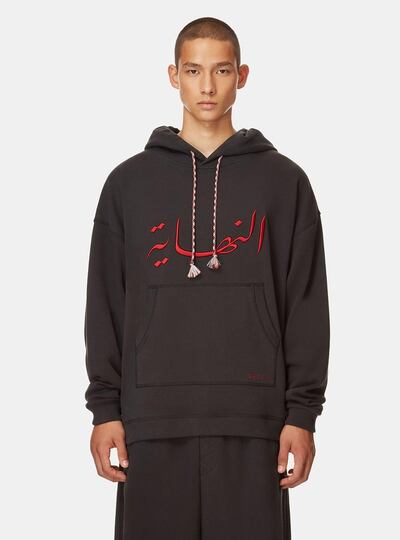The clothes were poetic and sharp, like the man who created them.
In an open-air industrial space in London, at six in the evening on June 8, 2019, Sheikh Khalid bin Sultan Al Qasimi unveiled his last menswear creations.
Leading up to Qasimi’s showcase, there had been considerable buzz among press and industry insiders about what the designer would show. Since launching his label and debuting his first collection at London Fashion Week in 2008, Qasimi had consistently impressed with his sophisticated take on men’s casual attire.
Another thing that impressed was his productivity: since 2008, he has shown at almost every season at Fashion Week, and they were robust collections too; his recent runway show comprised of close to 40 looks in total. That's no mean feat.
Today, Qasimi’s clothes are stocked in 50 stores, 30 cities and 15 countries.
At his London show, there were shirts, trench coats, jackets, and trousers, all flowy and billowing as they paraded to the tune of a hypnotic and uptempo musical score.
Qasimi had always been fond of playing with proportions, and this collection was no exception: the shapes were voluminous and the cuts were cosy. They looked like clothes that would feel right at home back in the UAE.
The garments came in a subdued monochromatic palette of creams, tans, greens and blacks, with jolting pops of yellow and pink. There were glimpses, too, of military-style camouflage and head scarves.
Such a polished yet relaxed aesthetic embodied what Qasimi explained was his romantic and hopeful vision of the Middle East’s future.
But these beautiful creations were, sadly, his final fashion collection. Qasimi, 39, died on Monday in the British capital – where he had lived for much of his life. .
After studying with an art scholarship at Tonbridge School in Kent, Qasimi read foreign languages at University College London, then went on to study architecture at the Association School of Architecture and fashion at Central Saint Martins. But he said he found his true calling in garment design, with his work inspired by "an urban nomad in the Middle East".
At Qasimi’s London presentation, models walked on a runway paved by some 12 tons of coffee grounds, sourced from a company that recycles them to make burning logs. “I wanted something poetic that evokes the senses,” Qasimi told reporters after the show. “It has the right texture and colour, and smells good.” Many attendees observed that the runway also reminded them of desert sand, an impression that Qasimi agreed with.
His clothes habitually referenced socio-political affairs, both in the Middle East and beyond. Growing up during the Gulf War, Qasimi often incorporated military garments, details and hues in his work. Speaking after his London show, Qasimi told us: “Coming from the Middle East, I have a duty to discuss politics. Fashion is my kind of material to work with and express it.”
A collection from autumn 2017 adopted the theme of "protests happening at the moment", as Qasimi told The National shortly before his London fashion show that season. "From Brexit, to the Dakota Pipeline protest, to Black Lives Matter … it is a time for people to stand up and voice their opinions."
While muted in colour and pattern, Qasimi’s clothes were indeed inclined to make a statement. His recent designs featured the phrases “Don’t Shoot”, “Amen”, “We are So Different Now” and “Blessed are the Beloved” printed in both Arabic and English. Another piece had the word “Provoke” emblazoned in front.
Poignantly, another of his garments featured the words “The End” in Arabic on the front, with “It ended before we began” printed at the back.
It was this combination of the literal and the alluded that made Qasimi’s work stand out in a bustling fashion industry over the past decade. That, and his fine work ethic, which is something many of his colleagues and loved ones have mentioned this week in their tributes.
After Qasimi’s death, the team at his fashion label released a collective statement that read: “His goal was to create a world of beautifully crafted products infused with cultural, social and political undertones to inform and inspire. The design world has lost a great philosopher and artist and we ask that the privacy of the family, team and brand are respected at this difficult time.”
Qasimi told us after his London show last month: “The clothes are to be lived in.” His design legacy lives on.
























